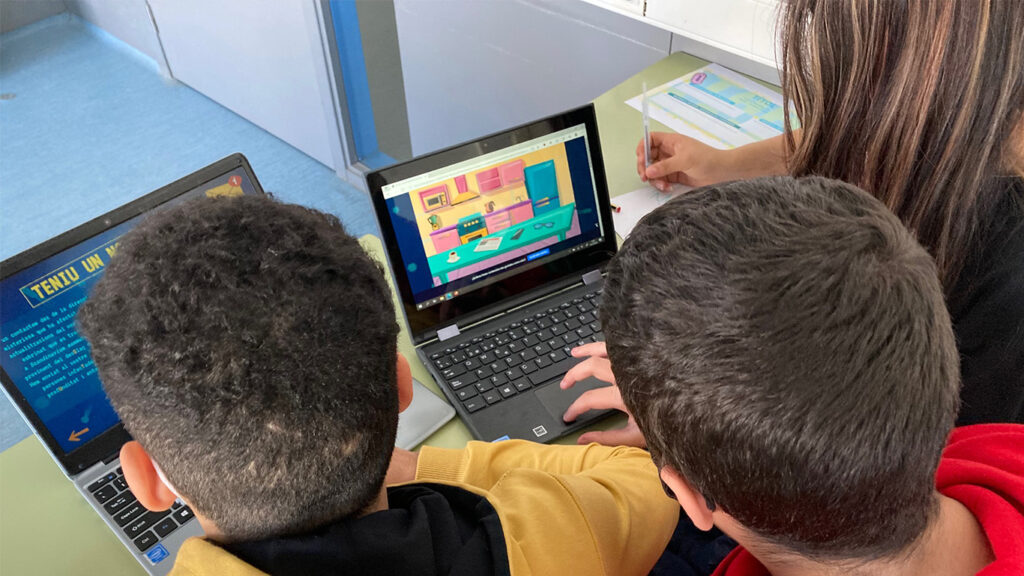Encourage critical thinking among high school students and promote, while playing, their interest in the knowledge of biomedicine and the scientific method: these are the main objectives of the STARS GAME project, an initiative that IDIBELL carries out together with three other European institutions, thanks to an Erasmus + 2020 grant, conceded by the European Commission.
STARS GAME is a 3-year project that revolves around the co-creation of a digital escape room, in which both the students collective (between 10 and 13 years old) participate, through classroom workshops, together with faculty and scientific research and also communication professionals from the four countries. The institutions that are part of this strategic alliance to promote innovation in science education are the Fondazione AIRC from Italy, the project leaders, Poslovno Svetovanje from Slovenia, HMGU from Germany, and IDIBELL.
In our country, during 2021, two workshops were held with teachers from four high schools in L’Hospitalet de Llobregat: Institut de Bellvitge, Institut Bisbe Berenguer, Jesuïtes Centre d’Estudis Joan XXIII and Institut Mercè Rodoreda. The first round of workshops, held in January, aimed to present the project. The second, in December, was intended to prepare the first implementation of the game prototype. During the month of February, the students of the four centers attended introductory workshops to the scientific method, knowledge and stereotypes evaluation, which allowed organizing institutions to gather useful data for the design of the escape room. Besides, a workshop based on the Design Thinking method was held with a group of research in April and May, culminating in the presentation of digital game prototypes based on biomedical challenges. Finally, during the month of December, with a very positive response from the students, the implementation of the first version of the escape room was carried out, counting on the participation of a total of 150 students from the four high schools.
In order to highlight the inherent multidisciplinarity in biomedical research, the STARS GAME escape room includes four itineraries, which allow students to put themselves in the shoes of scientists of four complementary fields, and work in a coordinated way to deal with an unknown infectious disease. Thus, in groups of three students, players can solve the challenges of the activity by being part of the anatomopathology, microbiology, immunology or molecular biology teams. After the activities of the escape room, which lasts approximately 60 minutes, the various groups share the experiences of the four itineraries. To close the experiment, each group prepares a scientific poster, based on the tests they had to pass, the challenge posed and the results obtained. The ultimate goal of the project is to encourage evidence-based reasoning, problem-solving skills, and critical thinking.
The contributions received during the workshops will be collected, at the end of the whole project, in two guides: a guide for teachers, developed to teach science with methodologies based on research and play, and another guide for research professionals for increasing scientific communication skills. In addition, so to share the conclusions of the project with a larger audience and at the same time ensure its impact and dissemination, each research institute will organize an informative event, open to other professionals in education, research and scientific communication.
Erasmus + is the European Union’s program that supports education, training, youth and sport in Europe. With a total budget of € 14.7 billion, it contributes to the Europe 2020 strategy for growth, jobs, equality and social inclusion.

This project has been funded with support from the European Commission. This publication [communication] reflects the views only of the author, and the Commission cannot be held responsible for any use which may be made of the information contained therein.
The Bellvitge Biomedical Research Institute (IDIBELL) is a biomedical research center created in 2004. It is participated by the Bellvitge University Hospital and the Viladecans Hospital of the Catalan Institute of Health, the Catalan Institute of Oncology, the University of Barcelona and the City Council of L’Hospitalet de Llobregat.
IDIBELL is a member of the Campus of International Excellence of the University of Barcelona HUBc and is part of the CERCA institution of the Generalitat de Catalunya. In 2009 it became one of the first five Spanish research centers accredited as a health research institute by the Carlos III Health Institute. In addition, it is part of the “HR Excellence in Research” program of the European Union and is a member of EATRIS and REGIC. Since 2018, IDIBELL has been an Accredited Center of the AECC Scientific Foundation (FCAECC).

